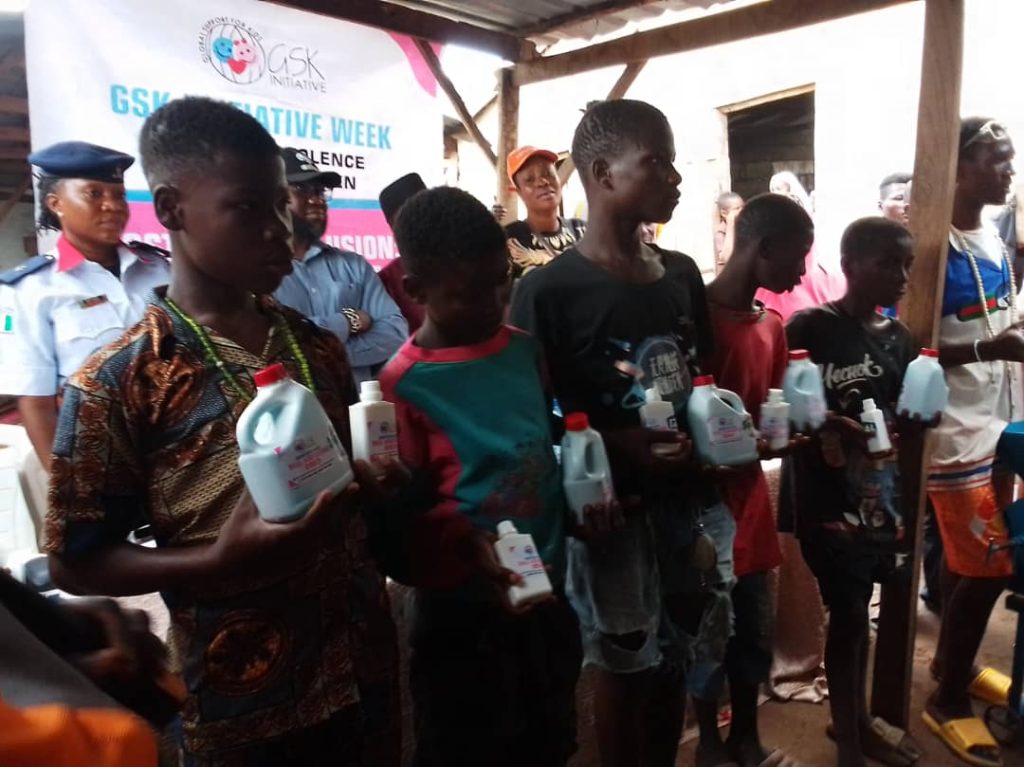…NGO Overwhelmed, Empowers 120 Victims
… How Police Exploit Us, Our Stories By Street Boys
In the heart of Ogun’s bustling markets and parks lies a hidden darkness that few dare to acknowledge. Behind the colorful stalls of Lafenwa, Kuto, Omida, Sapon,Panseke, Itoku, Adatan, Ijaye, Ifo, and countless others, a tale of lost innocence unfolds. DAUD OLATUNJI has captured the shocking details of youngsters loitering around the parks and markets in Ogun State, constituting a menace .
Here, amidst the chaotic market streets, young boys and girls, mere teenagers, find themselves ensnared in a web of despair.
These once-bright souls now roam these alleys, their laughter replaced by the haunting echoes of misdeeds. Smoking, stealing, and engaging in nefarious activities have become their daily rituals.
Some have tasted the cold, unforgiving bars of prison cells, and yet, for them, it’s just another chapter in a grim story. Imprisonment holds no terror; it’s almost a rite of passage.
An unimaginable incident unfolded when a teenager reportedly stole a sum of N15,000 and concealed it in his anus, rendering the policemen’s efforts in vain.
As the sun dips below the horizon, these lost souls seek refuge in the very markets and parks that have claimed them as their own. They sleep on cardboard boxes and makeshift beds, seeking solace amidst the chaos.
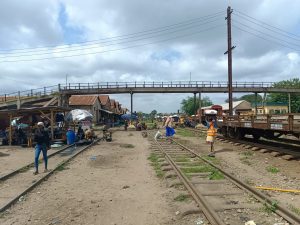
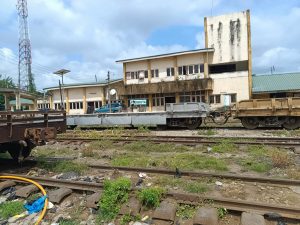
…A police station near the hideouts at Lafenwa
These once-children have become the property of these unforgiving realms, owned by the shadows that lurk within.
Yet, it’s not just the individual struggles that define this dark underbelly of society. These gangs are more organized than one could ever imagine.

Their unity birthed a criminal operation so audacious that it sent shockwaves throughout the entire state capital.
In a place where the very essence of humanity is tested daily, we are left to wonder – how did it come to this? How did Ogun’s vibrant markets and parks transform into breeding grounds for potential assassins?
The answer lies in the broken dreams, shattered hopes, and lost innocence of those who were once the future, now trapped in a never-ending cycle of darkness.
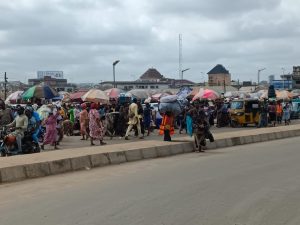
…. Homeless Teenagers Turn To Crime in Ogun Market: Omida Vendors Sound Alarm
Vendors at Omida Market have sounded the alarm over a rising concern involving homeless teenagers who are increasingly turning to criminal activities while struggling to survive on the streets.
These vulnerable children, primarily boys and girls, find themselves entangled in a web of hardships as they navigate the harsh realities of life on the streets. Often, they approach market customers, seeking financial assistance to meet their basic needs.
The situation has escalated to the point where market vendors have been forced to expel these homeless teenagers due to their disruptive nighttime activities.
In response to the challenges posed by these youngsters, market security and vigilante groups have taken proactive measures to restore order within the market’s vicinity.
Mr Alani Azeez, the meat seller while speaking on the menace of the youngsters in the market, said “I ‘ve been observing these children. They roam the market during the day, but, I doubt they stay overnight. If I were to guess, these children should be between seven and 15 years old. They wander the streets, soliciting money from people.
On their Begging Behaviour, Alani said “These young children, both boys and girls, circulate among market-goers, seeking financial support. When people don’t give them money, they often persistently cling to individuals until they receive assistance.”
Speaking on the root cause, Alani said “In my view, poverty is the primary factor driving these children into homelessness. Many of them come from unstable backgrounds, where their families struggle to make ends meet.
“These children are compelled to fend for themselves and contribute to their family’s income, even at a tender age.”
He however recommended,saying,”what I would suggest the government should do is provide shelter and support for these children. Directing them to motherless homes or shelters would ensure their safety rather than them sleeping around.
“Alternatively, sponsoring their education or organizing entrepreneurship training would equip these children with practical skills to empower them to create their own livelihoods.”
Mrs. Afolayan Martins, a pepper seller, recounted a time when these homeless teenagers nearly established a presence within the market, causing significant disturbances.
However, she said swift action by the market’s security and vigilant members sent them packing, issuing a stern warning that any child found sleeping within the market’s boundaries would be handed over to the Ibara Police Station.
Mrs. Elegbede, a pepper seller, expressed her concerns about the unsanitary conditions and discomfort experienced by these children.
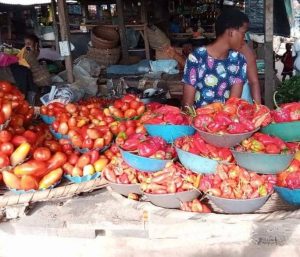
Mrs. Elegbede
She pointed out that they often resort to picking up items from the floor to eat. Moreover, they do not have a proper place to sleep, seeking shelter under the Panseke Bridge, and facing even direr circumstances during rainy seasons.
Mrs. Elegbede passionately appealed to the government for timely assistance and support for these vulnerable children, who, out of sheer necessity, navigate the streets seeking financial support from market-goers.
On her own, another pepper seller, Mrs Afolayan Martins, said “I’ve been in this market for a while, and I do see the children around this market.
“There was a time when these children almost established a presence within the market, they were disturbing everybody inside the market, messing the market up and all sort of bad things, sometimes they do steal things but, before it get worse than what we can control here we hired vigilantes to take over the market, to watch and Chase those children.
“The instruction was, any child found sleeping within the market’s vicinity would be handed over to the Ibara Police Station.
“The market’s security and vigilant members responded promptly to the situation by sending the children away from the market premises.
“And since then the children have not been sleeping in the market premises. Instead they go to panseke bridge to sleep overnight and the next morning they start walking about places.”
PLATFORM TIMES observed that these heart-wrenching circumstances shed light on the harsh socio-economic conditions that have pushed the young boys and girls into a life of homelessness and, in some cases, criminality within the confines of Markets in the state..
…. A Glimpse Into Lives Of Street Children At Panseke Market: A Cry for Help
In the heart of zone 2’s June 12 Panseke Market, a group of resilient market women and men has bravely unveiled the poignant struggles of the street children who have made Panseke their makeshift home, simply because they have no alternatives.
PLATFORM TIMES’s investigation showed the stark reality these children face, where the cold, unforgiving surfaces of the pedestrian bridge or the nooks and crannies within the market serve as their nightly refuge.
By day, their existence is marked by perpetual movement in search of sustenance, with no fixed location to call their own.
Amidst the market’s bustling activities, the persistent dirt and the pervasive stench that clings to these young souls stand as a poignant testament to the hardships they endure.
Mrs. Odewole, a provision seller, bore her heart, saying, “these street children often gather near my shop, their eyes drawn to the provisions I sell. There are moments when I must shoo them away due to their unsanitary conditions.
At times, they huddle near the refuse dump, hoping for morsels of discarded food. And when night falls, they brave the cold on the bridge, seeking shelter from the elements.”
With a heavy heart, she continued, “I see little being done to assist them in this market, beyond chasing them away when they ask for help. No one should have to endure such a life, especially not these innocent children. I’m deeply concerned about the significant presence of street children here in Panseke.
“They often gather near my shop, attracted by the provisions I sell. There are times when I have to ask them to leave due to their unsanitary condition.”
On the expected action by the Government, she advised “the government has the responsibility to address this issue. These children often sleep on the roadside, and sometimes, they wait near the refuse dump, hoping for scraps of discarded food.
” They endure the harsh cold on the bridge at night while seeking solace from the elements.”
Speaking on their activities, Mrs. Odewole said “I haven’t personally witnessed any theft or bag-snatching incidents involving them. Their primary activity seems to be begging for money.
“Surprisingly, they don’t disrupt the local market. They are easily recognizable due to their unkempt and dirty appearance, including both males and females, including some who have grown into adulthood.”
Expressing her heartfelt concern: she said “witnessing their plight, one cannot wish such a life upon anyone, let alone themselves.
” I’m not sure if they have any form of leadership or support structure. I recommend that the government intervenes to address this situation before it escalates further.
“It appears that not much is being done to assist them in this market beyond chasing them away when they beg.”
Mr. Ayo Opadere, the secretary at Panseke Motor park, recounted how the street children once sought help from travelers at the garage. However, their disheveled appearance led to them being driven away.
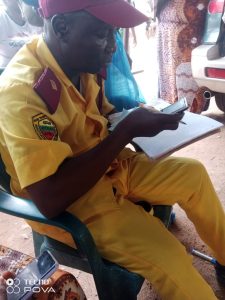
Opadere said ” here at this garage. It’s noticeable that these children have stopped coming to the garage, possibly due to the harsh treatment they received. In the past, they used to approach travelers for money, but their unkempt appearance led us to chase them away.”
On their abode, he said “I’m aware that these street children often sleep under the bridge and roam the streets in an untidy state.
” They seem to gather in government-owned areas. I recall a time when the government, along with the civil defense, conducted an operation at the garage, causing the street children to temporarily disperse. It seems that government intervention has had some impact.”
Speaking on their activities, Opadere said “however, I haven’t heard any reports of them being involved in theft or bag-snatching; their primary activity appears to be begging for money.”
Mr Opadere in his recommendation said “In my opinion, it would be wise for the government to engage with these children because idle hands are the devil’s workshop.
“By providing them with opportunities and support, we can prevent the potential for future criminal activity. It may be beneficial to work in partnership with them to promote peace and address their needs.”
In contrast, Mr. Alani Azeez, a compassionate meat seller at Panseke, urged against blaming these street children, recognizing the dire circumstances that pushed them onto the streets.
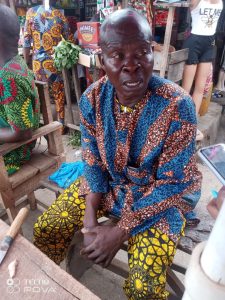
…Alani Azeez
He emphasized that many of them became homeless due to factors like losing their parents without any family support, escaping forced labour, or fleeing domestic violence.
Speaking on the challenges,Azeez said “these children face numerous challenges, many of which result from parental negligence. In my view, it’s important to understand that it’s not their choice to live on the streets.”
Azeez also shared his experience on various reasons for street life, saying, “some find themselves here due to family conflicts, which is truly distressing to think about – a child growing up without proper parental care or guidance. Others may be influenced by their peers, some have lost their parents and have nowhere else to turn, and a few have escaped situations where they were subjected to labour.”
On the future threats, Azeez said “while they may not pose a significant threat at their current stage, we must acknowledge that things could escalate if not addressed.”
Lamenting on the government’s inaction, Azeez said “When it comes to seeking government assistance to address the issue of street children, all we can do is hope and pray for divine intervention.
“Today’s government often appears to overlook these children’s welfare, prioritizing their self-interests over the future of these vulnerable youngsters.
“How can we expect those chasing corruption to genuinely care for street children?”
Also speaking on the matter, Chief Mrs. Gbadebo, the Assistant Market Leader of Egba, issued a passionate plea to the government, calling for urgent action to address the plight of these street children for the greater good of the nation.
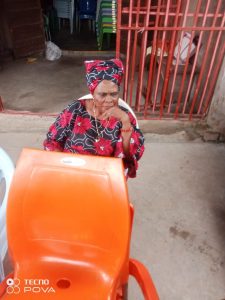
…Mrs. Gbadebo
She said “while I don’t possess extensive knowledge about these street children, I’m aware of their deceptive begging tactics, often weaving various stories. Some claim to be lost and in need of money to return home, while others mention the loss of their mothers and seek assistance.”
Speaking on their nighttime arrangements, she said ” they may be found around the garage area. These children typically do not disrupt the market’s activities.
“While they might occasionally have disputes among themselves, they generally keep these conflicts outside the market.”
On her recommendation, Mrs. Gbadebo said “I strongly recommend that the government takes steps to improve their welfare.
” Our nation’s well-being hinges on ensuring these children’s welfare, preventing them from potentially descending into criminal activities.
“Allowing them to turn to a life of crime could lead to a situation beyond our control.
” It is imperative that we enroll them in schools or vocational training, and for those who resist both, consider placement in rehabilitation centers for their correction.”
…Kuto Marketers Sound Alarm Over Rampant Theft and Street Children Menace
Marketers at Kuto market in Abeokuta, Ogun State, have raised their voices against the ongoing menace of street children who steal from them and create chaos in the market, prompting serious concerns over safety and security.
The vendors, who spoke to our correspondent, shared harrowing tales of theft, harassment, and intimidation by these children, many of whom are homeless, hungry, and abandoned by their parents.
Mrs. Sobola Iyabo, a pepper seller, recounted an incident where two children harassing customers in the market were arrested by the police, who subsequently detained their mother.
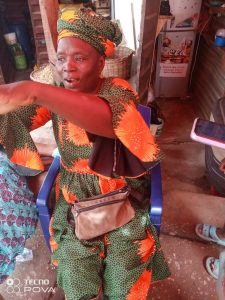
She explained that these children would cling to customers, seeking money until the police intervened.
“There are many types of children at Lafenwa. The government should help them, take them, and send them to school.
” Parents should also give their children to the government if they can’t take care of them. And those of them (children) that are stubborn, the government should deal with them,” she added.
Mrs. Oluranti Oladapo, the leader of the fruit vendors association, expressed grave concerns about the long-term implications of this issue.
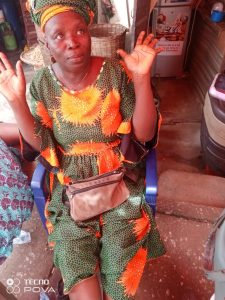
She highlighted that these children are reported multiple times a week, potentially growing into future threats as armed robbers or kidnappers.
To address the situation, some vendors have taken it upon themselves to rehabilitate these children, offering them jobs and educational opportunities within the market.
“These days, when we catch them, we give them the option to start work, like carriers, in the market, which they appreciate and start immediately.
“When they start, they see money, and ones that don’t see money, we ask them to meet us, so we can help,” said Mrs. Oladapo.
However, she cautioned that if not properly addressed by the government and society, some of these children could turn to more serious criminal activities in the future.
“These types of children, if anybody gives them money tomorrow to kill anybody, they would do it, especially children that sleep around. Most of them you see in cult groups are not there by their will,” she warned.
Mrs. Oladapo urged the government to tackle the root causes of the problem by providing birth control education and facilities for parents who cannot support their children.
She also called for measures to address the sale of alcoholic beverages that contribute to misbehavior among these children.
In addition to these challenges, the fruit vendors are facing difficulties in obtaining products from other states and countries due to the lack of rain and storage facilities for farmers.
Amid these woes, a victim of theft and fruit vendor expressed her frustration, having lost N200,000 recently. She pleaded with the government to take action to make the market a safer place for all.
As the situation intensifies, the call for immediate government intervention becomes increasingly urgent to protect both the vendors and the vulnerable street children.
This is what we do to tackle this issue. Some of them are not willing to steal, so they start work immediately, but those that want to steal, they leave the market, and when it’s around evening, they come back to steal.
“Unlike before, in a week, we receive complaints from fruit marketers about three times concerning the issue of theft by these children.
The government has tried; they warned everyone to go for birth control, but many people didn’t heed the advice.
“They should inform parents not to give birth to children they can’t cater for, and if they eventually have them, they should give them to the government to take care of them
Also, these children take very strong drinks, making them misbehave in society. The government should find a solution to it. These drinks are being brought into the state, and it’s contributing to violence in the community.
“Additionally, we face challenges in sourcing products from other states and countries because we lack reserves for our farmers here, and there is no rain.”
….Our Stories As Street Boys, Girls
My Journey to the Street: From Struggles to Dreams
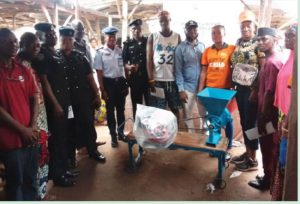
“I am Akanni Oladele, known as Bogostino on the streets, and at the age of 26, I’ve spent over a decade living on the streets. To many, my life might seem like a never-ending hustle, but for me, the street is where I’ve forged my dreams.
“Back in 2010, my journey to the street began. I faced numerous challenges, but it’s here on the streets that I found my purpose. You see, being a street guy isn’t just about survival; it’s about aspiring to greatness, even in the harshest of conditions.
“During my time on the streets, I’ve absorbed a wealth of knowledge. I’ve learned how to produce soap and even dabbled in the herbal medicine world, thanks to my dad’s influence. He was a native doctor, dealing in remedies like ‘Aporo’ and ‘jedi.’ I picked up those skills, but my dreams were limited by financial constraints.
“My father was an ‘Aporo’ herbal medicine dealer, and I aspired to follow in his footsteps. To start my own ‘Aporo’ herbal medicine business, I estimate I’d need around ₦300,000. This would cover expenses like acquiring a vehicle, getting the necessary herbs, and producing the product. It’s a dream worth chasing.
“But why am I on the street? I was chased away from home due to immense suffering. My dad, though well-intentioned, tortured me.
“It reached a point where I had to flee for my own sanity. My family tried to find me, and my dad brought me back home multiple times, but I always ran away.
“I preferred the streets because my father’s words hurt more than any physical punishment. It was as if he had employed those words to keep me away. And so, I chose to sleep outside, even in the rain. I grew accustomed to life on the streets.
“I have a wife who is an apprentice, and we haven’t had children yet. My father has three wives, and I’m the firstborn.
“Despite my circumstances, my younger siblings go to school, and I completed my primary education.
“I’ve learned various trades like tailoring, barbing, mechanics, blacksmithing, and carpentry.
“My dream is to establish my ‘Aporo’ herbal medicine company under the brand name Fresh Success Company. On the streets, I’ve become a coach, imparting my football knowledge to the youth.
“Though football might not have been my destiny, I’d gladly embrace an offer to become a national footballer. Yet, my heart remains with my herbal medicine business.
In my journey to the street, I’ve discovered resilience, dreams, and the hope for a better future. All I need is an opportunity and support, and I believe I can turn these dreams into reality.
… How I Found Myself on the Street: A Tale of Lost Dreams
“I’m Adurayo Abdulakeem, but on the streets, they call me OPA. I hail from Lagos State, and at just 19 years old, my life took an unexpected turn when I joined the street in February 2014.
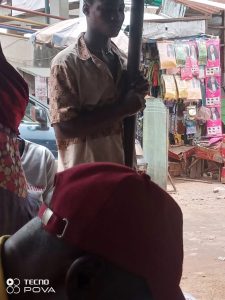
“My story might surprise you because my father is, by all means, a rich man. He sells meat for a living. However, the riches never translated into care for us, his own children. You see, he moved to Abeokuta, leaving us behind, and he rarely remembers the kids he left at home.
” I had a deep passion for education, but the funds were nonexistent. Even my older sister, who is now married, offered to help, but I felt uneasy asking for assistance.
“After all, I believed I had something I could do. You see, I knew everything there was to know about meat, having grown up around my father’s meat-selling business. I could have taken over the family trade, but meat selling had become an expensive venture.
“Life on the street isn’t easy, but we endure. Initially, we scraped by, picking up things from the ground to sell. But as time went on, we became exposed to new avenues of survival. It’s true; sometimes, the police arrest us, and we have to bail ourselves out.
“That’s one reason many of us remain here. The money we should use to escape this life often ends up in the hands of these policemen. There’s one story about a guy at the police station who was asked for a staggering eight hundred thousand naira (#800,000) just for his release, all because of what he sells.
“We understand that what we do isn’t entirely righteous, but it’s our way of avoiding a life of theft. We believe that a thief will eventually be caught, so we engage in these activities to steer clear of that path.
“Yes, I’ve been arrested before, somewhere around 2020 or 2021. I can’t say how much they paid the police to secure my release; it’s a dark cloud in my memory.
“There’s one day that haunts me—the day Lafenwa caught fire. I wasn’t here; I was in Lagos at the time. They described the losses from that fire, and it weighed heavily on me. You see, what some of us use to sustain ourselves went up in smoke. Tragically, some lost their lives in that inferno, consumed by the flames.
“Despite my life on the street, my dreams haven’t dimmed. I yearn to go back to school, to continue my education. I dropped out in JSS2 at Egbe High School, and it’s a decision I deeply regret. All of this stemmed from my father’s neglect. Despite his wealth, he preferred to spend it on parties and bar visits, neglecting his own flesh and blood. It hurt, and it’s why I left home.
“We may not steal, but if we catch one among us doing so, we become the judges and mete out punishment just as thieves are treated. It’s a code we live by, forged through hardship and adversity on these unforgiving streets.”
… How I Control Over 500 Street Boys In Ogun Markets-Gang Leader
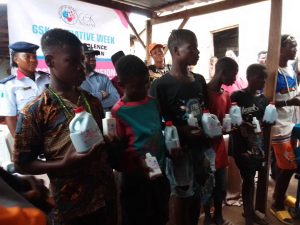
Meet Kayode Shinade, but you may know him better as Alhaji Shoba. Hailing from Abeokuta, he has called Lafenwa home since 2005, a place where the winds of change brought him not only marriage but also fatherhood.
Shinade is more than just a street dweller; he’s a beacon of hope for many. He’s been associated with GSK, an organization dedicated to transforming the lives of children.
Through their efforts, they’ve nurtured talents, sent young souls to school, and empowered budding entrepreneurs. In the heart of the street, dreams have been kindled, and futures reshaped.
But Shinade’s journey to the street was a result of a storm in his home. A dispute over missing money led to accusations, and he was wrongly blamed for the theft.
While the truth eventually came to light, the experience had left its scars. It was then that his resolve to leave home solidified. His mother, however, urged him to go, a decision that still weighs on his heart.
Leaving his home in 2005, at the tender age of primary six, Shinade stepped into a Lafenwa that was far from the developed place it is today. His father was no longer there to guide him through these tumultuous times.
His mother, a steadfast presence in his life, remained alive. Their communication was a lifeline, a connection he cherished deeply.
He even rented a room for her, hoping to unite his siblings under one roof. Yet, a series of unfortunate events would unfold.
Shinade found himself involved in a communal effort to support a neighbor’s naming ceremony. Unknown to him, one of those involved had a criminal history. Soon, Kayode and others were implicated in a robbery case that wasn’t their doing.
The arrest, carried out by the Special Anti-Robbery Squad (SARS), took place in January 2017. Kayode spent four harrowing months in detention, his family cut off from him.
Charged with robbery, he faced an arduous legal battle that ultimately led to a two-and-a-half-year prison sentence. Despite the ordeal, he saw it as a twist of fate, a divine intervention.
Prison, in his eyes, saved him from potential harm on the streets, where he was known as a street fighter. In prison, he stayed clear of conflicts.
In 2019, with the help of a compassionate SARS officer, Shinade and his companions were released. Back on the streets, he resumed his life, a testament to the indomitable spirit of one who faced adversity head-on.
His story is one of survival, redemption, and the unbreakable bonds with his mother, a bond that transcends the hardships life has thrown his way.
Shinade paints a vivid picture of the world within the streets, a world where both young and old find themselves, seeking a semblance of life amid hardship. His voice carries the stories of seven and eight-year-olds who call the streets home, numbering over 500 souls.
Education seems like a distant dream for Shoba, but his unwavering faith in business keeps his hopes alive. He shares, “There is no type of business I cannot do except illegal ones like drugs.
If it is water, I can sell it.” His entrepreneurial spirit was kindled at a young age when he hawked bean cakes for his mother. Now, he is open to any legitimate opportunity to earn a living.
Shinade’s perspective on blessings and the role of destiny shines through his words.
He believes that no matter how much one receives, it’s ultimately in God’s hands whether it will bring profit or not. His frugality is evident in how he stretches even small amounts of money, understanding that resourcefulness is vital on the streets.
He sheds light on the network of street dwellers that spans various locations, from Kuto and Omida to Ijaiye and Panseke.
They hustle together, searching for cartons, empty bottles, or even a place to sleep. In times of importance, they communicate across these locations to ensure everyone is informed.
Shinade’s advice to the government is a plea for help, particularly for the younger generation. He acknowledges that not all street dwellers are criminals, as some face dire circumstances due to family backgrounds.
He emphasizes the potential these young minds hold for business ventures if given the right opportunities.
Addressing misconceptions, Shinade explains that Lafenwa residents generally avoid market days due to unfounded blame for market-related issues. The presence of various communities collecting market fees has contributed to this misunderstanding.
Married and having rented an apartment, Shinade is now a family man, cherishing the responsibilities and joys that come with it. He reflects on the past, a time when they had the freedom to sleep anywhere, and life felt simpler compared to the present.
However, a haunting memory lingers, a night when police chased them away from a bridge, pushing them to the brink of despair.
Though they escaped, one member was electrocuted, a stark reminder of the dangers they face. Shoba was confined to his home for a month after this ordeal.
The presence of the police continues to cast a shadow over their lives, with periodic raids and arrests. Even those who seek shelter under the bridge are not spared. Fear and uncertainty loom, causing them to stay away from the streets on market days and cautious about when they venture out.
In Shinade’s words, the world of the streets is one of struggles, hope, and community. It’s a world where resilience prevails, and faith in the face of adversity keeps the human spirit alive.
He said “presently, there are many both young and old. There are seven, eight years boys and girls on the street.
“They are more than 500. I doubt it if I say I can still go to school but only I believe in business.
“There is no type of business I cannot do except illegal ones like drugs. If it is water, I can sell it. When I was young, I hawked bean cakes for my mum till I grew up.
“On what I will need, I pray God should have mercy on us. I only believe whatever the government has. It is only God that blesses us because if someone is given ten million naira and God says it will not profit the person, it will surely not. I believe so much in that.
“If I tell you to give me ₦10,000 that I want to use for something, if you see me again I will tell you that it was that ₦10,000 I am still using.
” Yes, those that are at Kuto, Omida, Ijaiye, Panseke are people from Lafenwa. They hustle to this aforementioned places in the morning. Some are in search of carton to survive, some, empty bottles, some will even sleep over. They are also at the mortuary.
“If something want to happen or we know we have an anniversary, we will send some people to each place to inform others.
“My advice for the government, This world is very small. There is nothing in running helter skelter , whatever God has destined for a man will surely come to pass. It doesn’t matter how far it is. If the government wants to be of help, I plead they should help our younger ones. There are some among them that cannot work, not all of them are thief, some other’s story are from their mothers side. They all have knowledge for business.
“On stealing and theft in the market, the thing is that ‘we’, Lafenwa people don’t use to go out on market day. If not for baba, you will not see them out because people believe that whatever happens in the market we are the one behind it when we are not the one. The thing is that Lafenwa is like a place for many people. Abule otun, Agoka and Adatan people do come there to collect market fee.
“I am married. I’ve rented an apartment. I’m married and I also have children.
“In our time, there were a lot of railways. Some will spread their mat and sleep under the train, some will make use of a bench and sleep on it. During our time Lafenwa was tough but we have a free world, we can sleep anywhere compared to this time which we view as the way the country is.
“My memory day,that was the day police chased us away from this bridge, I believe that will be the end of my life. That very night, we were not aware that they (police) had got to Adewole.
“We are many and we even have female among us although, someone told us that the police are on their way but we thought within ourselves that we have no business with them so we sat down, within a few minutes, they arrived. We were shocked and started running for our dear lives.
“There was one guy that was electrocuted, we thought he was dead. It was a bad day. The incident happened around twelve in the midnight when everyone has prepared to sleep. Thank God that we all escaped. It was an indelible day that I had to spend one month at home.
“About the police,they are still raiding and arresting us, even some people that slept under the bridge were arrested and sent to prison . We don’t come out on every market day and some days when we sense it might be tough, we stay away.
… How NGO Transformed Lives of Street Children in Ogun Markets

.. Alfred Akingbade Soleye,the Country’s Director for GSKI
PLATFORM TIMES gathered that, at one point, a pivotal meeting was convened with the involvement of Terre Des Hommes (TDH), a renowned “Home for Children” organization based in the Netherlands.
Findings showed that the proposed objective was to rescue 120 children from the shadows of two major markets in Ogun State, specifically targeting Ifo and Lafenwa markets.
As the project kicked off with determination, it quickly became evident that the scale of the issue surpassed initial expectations.
Speaking with PLATFORM TIMES on the activities of a Non Governmental Organisation, the NGO, the Global Support for Kids Initiatives, GSKi, it’s Country Director, Mr Akingbade Soleye said “from December 2022 to August 2023 the total sum of money spent on rehabilitation and empowerment was N2,579,000.00.”
He added that in the next three months, the NGO plans to enrol 12 of the street boys into vocational training.
He said “so, also we have planned to reintegrate 12 of those of them between the age of 6 years and 13 years back into the family and do proper follow up.”
According to the Country Director, in the heart of Lafenwa market alone, an astounding 250 children were discovered, exceeding the project’s original budget. It was a daunting challenge, one that threatened to undermine the very essence of the mission.
However, it was observed that collaboration and support from various organizations, the NGO was able to surmount the financial hurdle.
He hinted that relying solely on TDH’s funding would have been a gamble with the future of these vulnerable children.
Soleye disclosed that the rescue approach adopted by the NGO was nothing short of transformative. School-aged children were given a second chance at education, their futures realigned toward brighter horizons.
He said for the street children who called the market their makeshift home, the intervention was framed as a rescue from the market itself, rather than from the unforgiving streets.
He said “this distinction held profound significance, especially for those children who had been transported from the Republic of Benin.
“Tragically, these young souls had been brought across borders, with those who brought them receiving upfront payments, condemning the children to a life of work without recompense.
The GSKI’s intervention didn’t stop at the children; it reached out to their employers.
“Through tireless negotiation and advocacy, these young ones were enrolled in Lafenwa’s military school and St. John’s at Abule Otun.
“The fusion of the plight of Benin’s transported children and Ogun’s street children resulted in a collective total of 250 beneficiaries.
“As the children embraced education and skill-building, the market slowly shed its harsh exterior and revealed the seedlings of hope.
“The transformation was not only tangible but also deeply emotional.
“Young lives that were once teetering on the precipice of despair were now on a path to self-discovery, resilience, and potential.
“The story of the NGOs intervention in the markets of Ogun State is a testament to the extraordinary change that can be ignited when compassion and determination intersect.
” It is a story that underscores the profound impact of rescue, not just from physical locations but from a future that had seemed destined for darkness. It is a story of newfound hope, nurtured in the most unexpected of places.”
…Ogun CSO Chairman Issues Stark Warning, Says Assassins Are Being Nurtured

Comrade Bankole Solomon, Chairman of Civil Society Organisations (CSO) in Ogun State, delivers a chilling prediction of a bleak future if immediate measures aren’t taken to address the escalating activities of street children.
He lamented further that the boys and girls, aged between 10 and 15, are spotted in places like Lafenwa and local markets, engaging in criminal activities and substance abuse.
Comrade Solomon describes this situation as deeply unfortunate, highlighting the absence of a clear and comprehensive youth programme in the state.
He emphasizes that without intervention, these restless youths are at risk of progressing from petty theft to more dangerous criminal activities, potentially posing a severe threat to society.
He places responsibility on the government, emphasizing that one of its primary objectives is good governance, which includes providing productive outlets for young people’s energy and restlessness.
However, he argues that the Ministry of Youth in Ogun State has fallen short in this regard, failing to implement effective programs for these vulnerable children.
Comrade Solomon urges immediate action, drawing attention to the alarming scenes in Lafenwa, where these young individuals operate with impunity, intimidating even those near police stations.
He concludes by emphasizing the urgency of government agencies coming together to create a focused and direct plan to address this crisis.
Failure to act, he warns, could lead today’s phone thieves to become tomorrow’s dangerous threats to society.
He said ” when you move around, you will see children less than 15 & 10 ,they smoke close to police station, they sleep around and nobody will complain.
” And if today, a boy happens to be a thief he will graduate to be a robber and he might migrate to be an assassin and they might all kill us .
“The problem can not be taken away from the government. The primary objective of any government is good governance and when you don’t have a programme for people like that and don’t forget at that age they are so restless and if you cannot convert such energy, such restlessness into a positive way.
“They have no choice than to use that same energy to be a learner to the society, so, in a short way, I will tell you that, I can say the Ogun state government (ministry of youth ) is found wanting in that area.
“There is no programme for this children. Ask at Lanfewa, a lot is happening, you will see children,you will be afraid with your phone and close to the police station, you will see them everywhere and nobody is asking any questions, they are lords to themselves.
“So, I can tell you that, the situation is a sorry situation and I don’t see any wayout until the government and agencies come together to have a direct and focus on what to do to make it work.
” If not, for these children of today that we call phone stealers, tomorrow they will end up to be dangerous to you and I in the future.
… Street Boys: A Desperate Cry for Help in Ogun State

..PCRC Chairman,Ogun, Samson Solomon
In Ogun State, the Police Community Relation Committee (PCRC), under the leadership of Chairman Samson Popoola, is raising a poignant alarm about the growing population of street boys and the dire consequences of neglecting their welfare.
Popoola’s deep concern stems from the fear that these vulnerable young individuals may grow into hardened criminals due to societal neglect.
He highlights a disturbing pattern: “Arrest a street worker today, put him in prison, and after just three months, he may graduate as an armed robber.”
This cycle of crime and incarceration troubles Popoola immensely, especially considering the conditions within prisons. “Go to the prison today, and you’ll find many individuals who’ve been condemned to death but haven’t been executed,” he laments.
He added “the government isn’t signing off on these cases, and these individuals are left languishing in despair.”
Popoola emphasizes that it’s not a matter of religious conviction. “Whether you’re a Christian or a Muslim, if you aspire to become a governor, you must fulfill the duties of that office,” he says.
“Signing off on condemned cases is one such responsibility, and it’s essential for maintaining the rule of law.”
The PCRC, together with security agencies and the press, seeks to shed light on this pressing issue.
Their collaboration aims to raise awareness and advocate for decisive action. Popoola believes that everyone has a role to play in ensuring that the right measures are taken to address the plight of street boys and prevent their descent into criminality.
Ultimately, the story of these street boys is a call to action for both individuals and the government. It’s a stark reminder that neglecting the welfare of vulnerable youth not only perpetuates a cycle of crime but also jeopardizes the future of communities.
The PCRC’s message is clear: it’s time for society to step up and ensure a brighter future for these young lives.
Speaking on the causes, Popoola,said “firstly, we have to look at it from so many perspectives,” Popoola begins. “When you look at very advanced countries like China and New York, we still have a lot of homeless people.
We even have some of them that will go into crime deliberately, especially during the winter period, just to find shelter and food.”
Popoola emphasizes the importance of understanding the economic circumstances that lead people to homelessness. “Maybe it could be due to the fact that the parents are unable to provide for them, or many of them couldn’t afford accommodation despite coming of age,” he says.
This raises questions about the government’s role in providing social security and supporting those who can’t secure decent employment.
The issue of irresponsible parenthood is also a concern for Popoola. “If a child ends up on the streets because the parents couldn’t meet basic requirements, it raises questions about why they had more children than they could care for,” he asserts.
Furthermore, Popoola highlights the limitations of security agencies in dealing with this problem. “Arresting them without a clear plan for rehabilitation or empowerment can lead to a cycle of criminality,” he points out.
Popoola’s PCRC is on a mission to reduce criminality, but he emphasizes the distinct challenges posed by homeless individuals. “Someone without shelter may resort to crime just to eat. Do we have social programs in place to address this?” he asks.
He also calls for greater government involvement in providing for citizens’ basic needs.
“We need to ensure that even those without jobs have access to a living wage and basic necessities. This can prevent many from turning to crime out of desperation,” Popoola explains.
Popoola believes that a multi-faceted approach is required to tackle the interconnected issues of homelessness and rising crime rates. Addressing economic disparities, responsible parenthood, rehabilitation, and social security programs are all vital components of the solution.
Through the PCRC’s advocacy and collaboration with relevant stakeholders, they hope to pave the way for a safer and more secure future for all citizens in Ogun State.
… Street Boys, Girls,Govt. Responsibility Not Police -PPRO
THE Police Public Relations Officer in the state, Omolola Odutola while reacting to the menace of the youngsters, said police are not meant to chase homless boys and girls,but, criminals.
Speaking on the allegation of policemen turning these youngsters to business by raiding their settlements, Odutola said bail is free.
She said ” homeless boys and girls are responsibility of the government. I have not had reports by any DPO who arrested homeless persons. Police arrest criminals who are found culpable in stealing, vandalism or any other criminal acts.
“When Police go on raiding, they arrest persons on reasonable suspicion and potential persons who may pose a threat of risk. Screening is conducted to ensure the persons arrested are given a room to defend any suspicious action.
“Bail is free and released to a reliable surety, anyone alleging that money was collected or bargain should approach the office of the CP.
“Crime is consuming and a backward approach to nation building . Young persons should engage in Legitimate ventures.”

… Opeyemi Olajide Olowookere, the President and the Executive Director of Global Support For Kids Initiative
…GSK Initiative Rescues, Uplifts Vulnerable Children
In a powerful move towards humanitarian service, the Global Support for Kids Initiative (GSK Initiative) is emerging as a beacon of hope for society’s most vulnerable.
As a community-based non-governmental and non-profit organization, GSK Initiative is dedicated to combatting the alarming rise in child abuse and extending a lifeline to street children.
On it’s Mission to Save Lives, GSK Initiative’s unwavering commitment revolves around providing essential services such as food, clothing, hygiene products, and valuable resource information.
Their multifaceted approach aims to shape a brighter future for children through research, education, advocacy, and collaboration with various stakeholders.
On its Vision for Every Child, at the heart of their mission lies a vision where every child enjoys the fundamental rights of survival, protection, development, and participation. GSK Initiative tirelessly supports individuals and organizations working to safeguard children from abuse and neglect, not only in Africa but worldwide.
On it’s guiding principles, the NGO Initiative’s core principles are firmly rooted in listening to children, focusing on solutions that enhance their lives, prioritizing their safety and well-being, and fostering collaboration with like-minded organizations.
With roots dating back to 2003 in Nigeria, West Africa, GSK Initiative’s initiatives and campaigns have left an indelible mark. They have touched the lives of over 100 street children through various programs:
It has been offering informal education to marginalized street children, empowering them with knowledge and self-confidence.
It has also been breaking the cycle of poverty and crime by providing valuable vocational skills.
In it’s psychosocial activities: it offers support to help children cope with the stress and trauma of their situations, bringing a sense of normalcy.
According to it , the 3R’s Street Intervention are ; Rescue, Rehabilitate, and Reunion which means ; reuniting children with their families after thorough investigation and support.
Feeding and Hygiene Support: Ensuring the well-being of street children is a top priority.
Interactive Sessions: Actively engaging with street children, understanding their challenges, and offering assistance and advice.
Moral Education: Equipping children with essential life skills to help them transition away from street life.
Community Sensitization: Educating the public about the plight of these children and encouraging compassion.
Orphan and Vulnerable Children Support: Sponsoring the education of children who have lost one or both parents.
Welfare Committee Meetings: Facilitating communication and feedback from street children to drive organizational goals.
Through a wealth of resources and their hands-on approach, GSK Initiative has provided hope and a sense of purpose to countless street-connected children. Their vocational training programs and successful reintegration efforts have transformed lives.
…About 23 million (83.5%) Children under 5 in Nigeria multidimensionally poor-NPM
THE statistics obtained from the Nigeria Poverty Map has shown that tnongewer than 23 million children who are under five years are multidimensionally poor.
The Nigeria Child MPI 2022 obtained by PLATFORM TIMES revealed that the Nigeria Child Multidimensional Poverty Index (CMPI 2022) shows that on average, the multidimensionally poor children in Nigeria experience 38.5% of the weighted deprivations that make up Nigeria’s CMPI.
The Child MPI makes visible how child-specific deprivations exacerbate the condition of children under 5 who were already poor according to the Nigeria MPI. Child poverty is particularly prevalent in rural areas, with almost 90% of rural children experiencing poverty.
According to the statistics, over 5 out of 10 (56.6%) children are multidimensionally poor and deprived of child engagement.
It stated “a household is deprived if in the past one month no child was engaged by a household member older than 15 in at least four of the following activities: reading books; telling stories; singing songs; being taken outside; played with; name/count or draw.
“About 1 out of 3 (31.4%) children are multidimensionally poor and deprived of professional birth attendance.
“A household is deprived if there is a child (0–4) whose birth did not involve a doctor/nurse/medical professional but was attended to by a traditional birth attendant.
“More than 3 out of 10 (30.7%) children are multidimensionally poor and deprived of adequate supplement.
“A household is deprived if there is a child (0–4) who has not received a vitamin A supplement during the last six months.
“About 3 out of 10 (30.5%) children are multidimensionally poor and severely undernourished.
“A household is deprived if there is a child (0–4) in the household who is severely undernourished.
“Over 1 out of 4 (27.4%) children are multidimensionally poor and deprived of child engagement.
“A household is deprived if there is a child (0–4) in the household that was not exclusively breastfed for the first six months of life.
“About 1 in 4 (26.0%) children are multidimensionally poor and deprived of adequate child care.
“A household is deprived if a child (0–4) in the household was left in care of a child under 10 years old for more than 1 hour in the past seven days.
“Over 5 out of 10 (56.6%) children are multidimensionally poor and experience deprivation in immunisation
A household is deprived if there is a child (0–4) in the household who has not received all their required immunisations.
“About 1 in 5 (18.6%) children are multidimensionally poor and do not have adequate access to playgrounds
“A household is deprived of children (0–4) do not have safe space outside the house where they can play.”
.. 3.7million People Multidimensional Poor In Ogun -NPM
The Nigeria Poverty MAP has state that 68.1 per cent which translates to 3.7million people are suffering from multidimensional Poverty in Ogun State.
PLATFORM TIMES obtained the statistics from NPM on Monday.
The NPM states ” the Nigeria MPI 2022 shows that about 7 in10 (68.1%) people in Ogun State – 3.7 million – are multidimensionally poor. On average, the multidimensionally poor
“Ogun State experienced 42.4% of the weighted deprivations that make up Nigeria’s MPI.
“A significant proportion of this poor population are deprived of adequate sanitation, access to cooking fuel and healthcare.”
According to the statistics, Health related deprivations significantly contributed to multidimensional poverty in Ogun State
It says “over 6 in 9 (63.3%) people in Ogun State are multidimensionally poor and deprived of improved sanitation facilities
Unimproved sanitation facilities include: flush to somewhere else or unknown place (not sewer system, septic tank, or pit (latrine)); pit latrine without slab; bucket; hanging toilet or latrine; and no or other non-improved sanitation facility.
“About 6 in 10 (58.0%) people in Ogun State are multidimensionally poor and deprived of food security and timely access to healthcare.
“The Food Insecurity Experience Scale (FIES) assesses food-related behaviours and experiences associated with increasing difficulties in accessing food due to resource constraints.”
“About 6 in 10 (58.0%) people in Ogun State are multidimensionally poor and deprived of timely access to healthcare
A household is deprived of access to healthcare if it takes over 30 minutes to reach the nearest functional health facility on foot.
“About 7 in 10 (69.8%) children in Ogun state experience deprivation in Child engagement. A household is deprived if in the past one (1) month no child was engaged by a household member older than 15 years in at least four of the following activities: reading books; telling stories; sing songs; be taken outside; play with; name/count or draw.”
…Nigeria Has 20 million Out-Of-School Children – UNESCO
According to the statistics by the United Nations Educational, Scientific and Cultural Organisation, (UNESCO), Nigeria now has about 20 million out-of-school children.
The statistics showed that India, Nigeria and Pakistan have the highest figures for out-of-school children globally.
According to the UNESCO, there are “244 million children and youth between the ages of 6 and 18 worldwide (who) are still out of school.”
According to the statistics, India, Nigeria and Pakistan have the highest figures for out-of-school children globally.
The figures in Nigeria have oscillated between 10.5 million and around 15 million for more than a decade, with the situation growing worse due to the degenerating security situation in the country.
…Ogun State Government Launches Ambitious Plan To Tackle Out-of-School Children Crisis

In a significant move aimed at addressing the alarming issue of out-of-school children, the Ogun State government has unveiled a comprehensive plan, including a range of incentives, to boost school attendance.
Mr. Femi Majekodunmi, Chairman of the State Universal Basic Education Board (SUBEB), made this announcement.
He highlighted the apathetic stance of some parents as a key factor contributing to low school enrollment rates in the state, emphasizing that Nigeria currently ranks among the countries with the highest number of out-of-school children worldwide.
Under this initiative, the government has outlined strategies to revamp primary school facilities by ensuring consistent funding support for infrastructure upgrades, a commitment guaranteed through federal government intervention programs.
Do you want to share a story with us? Do you want to advertise with us? Do you need publicity for a product, service, or event? Contact us on WhatsApp +2348183319097 Email: platformtimes@gmail.com
We are committed to impactful investigative journalism for human interest and social justice. Your donation will help us tell more stories. Kindly donate any amount HERE

